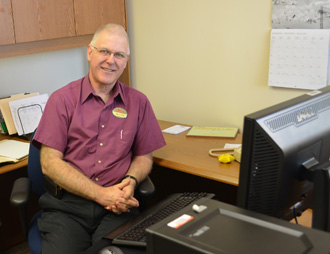|
Allen Clayton, PhD, has rejoined the McDermott Library staff as its new Digital Projects Librarian, working to build and maintain Treasures, the library’s digital repository for university images, documents, and other materials. Although still in its infancy, Treasures will feature two main areas: (1) the University Archives and (2) a digital home for the "life, research, and scholarship" of the University and its community. The former will fall mainly to the library’s Special Collections; the latter project is being spearheaded by Clayton.
Digital repositories are, according to Clayton, becoming increasingly common at universities. The University of North Texas is one example of a local institution that has established a substantial digital repository that already includes the type of content that Clayton is planning for UT Dallas Treasures.
Benefits. In this age – when most organizations and businesses and many individuals already have an electronic presence – what special role can a repository like Treasures play, and what unique benefits can it offer? Clayton suggests that Treasures be considered part of the university’s long-term memory. "Many things on the web are contemporary – more like short term memory," he said. "And to [advance] the analogy, things in short term memory have to be pushed into long term memory or they disappear. Presence on the web doesn’t necessarily translate into preservation of items with historical value."
Filling the Virtual Shelves. Practically speaking, constructing this type of long-term institutional memory will involve reaching out to various campus constituent groups:
Students. Students will be invited to take advantage of Treasures’ digital space as a place to electronically house the quality work they produce every year but that is rarely preserved for others to enjoy and learn from: online portfolios for graduation, presentation posters, article preprints, capstone projects, films, conference presentations, etc.
Staff. Staff members from various departments and research centers will also have the opportunity to contribute to the repository. For example, Clayton says, UT Dallas Athletics currently maintains a "wonderful website full of historical information about the Comet teams. You’ll notice if you look closely that historical information about the earliest Comet teams is either scant or nonexistent. That’s because collection of that sort of data (stats, pictures, etc.) was not done on a systematic basis until Bruce [Unrue, the current Associate Athletic Director for Media Relations] came on board in the early 2000s." Together, Clayton and Unrue are working to ensure that the athletic tradition UT Dallas is creating will not be lost, by using Treasures to digitally preserve as much of what exists from this era as possible, and by regularly adding new materials to the repository archive.
Faculty. Professors can submit published articles or preprints to be stored and made available on Treasures as part of a publically-available narrative about UT Dallas faculty contributions to scholarship in various fields. More significantly, Clayton believes that Treasures can be used the fill the gap that currently exists with respect to the scholarly work done here at UT Dallas every year that is not preserved. "The articles and books get published," he says,
|

"but what about the conference and poster sessions, the data sets, and artistic creations?" Citing his experience as a reference librarian, Clayton recalls that one of the most difficult questions to answer was "How do I find this paper, presented at such and such a conference?" The best option at that time was to provide “an abstract and maybe a contact address for the author." A better solution, Clayton offers, would be for Treasures – and other institutions – to begin collecting that kind of work produced by faculty, staff, and students and to publish it on the web.
Taking a longer view, Clayton predicts that Treasures will eventually follow the route of other digital repositories and take on projects with outside groups. He suggests Treasures could form a partnership with the City of Richardson or local newspapers in order to preserve a record of the relationship between the university and its local community.
History. The development of Treasures has been a long process that progressed in "fits and starts." Initially, UT Dallas participated in a statewide project, the Texas Digital Repository. The university eventually pulled out of that endeavor, and returned to the idea of a self-contained digital collection. After experimenting with several types of software, the transition to a new open source tool, DSpace, was complete. Now that the position of Digital Services Librarian has been filled, the online storehouse is ready to be filled as well.
Clayton has been at UT Dallas since 1987 when he worked as a reference librarian and a government documents librarian while pursuing a doctorate in Religious Studies with emphasis in Church History at SMU. In 1992 he was named the senior librarian the UT Dallas Callier Center Library.
Ellen Safley, Director of Libraries, says Clayton is uniquely qualified for this position: "His long tenure at UT Dallas gives him a familiarity with and an appreciation for the University’s mission and history. Running the Callier Library included a lot of interaction with faculty and administration. He understands library public services and has a good grasp of the technical services side as well. His academic training gave him the skills of an historian. He has always been tech savvy in terms of software and hardware."
Want to find out more? Have some work to contribute or some time to spend helping with the Treasures project? Contact Allen Clayton at [email protected] or (972) 883-2949.
|



